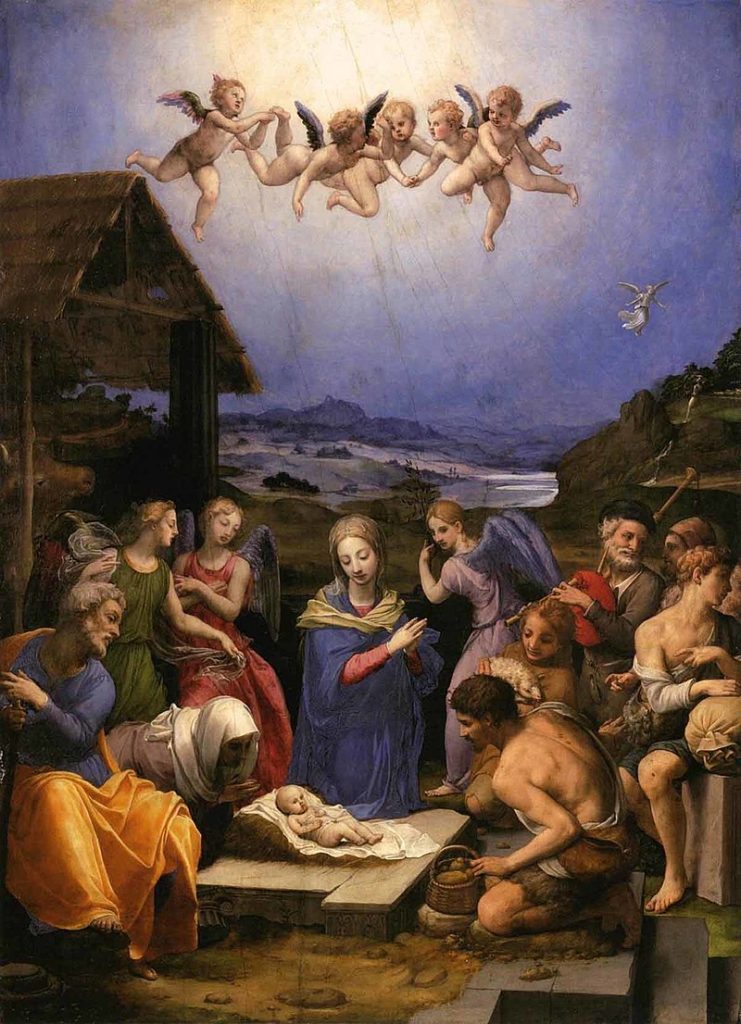
Christmas
I’ve never shared John Milton’s “On the Morning of Christ’s Nativity” before because it’s such a long poem, but I include a few stanzas today. Written when he was 21, it’s a bit formal for modern tastes but still has some delicious images. In the opening stanza, the poet celebrates the happy day:
This is the month, and this the happy morn,
Wherein the Son of Heav'n's eternal King,
Of wedded Maid, and Virgin Mother born,
Our great redemption from above did bring;
For so the holy sages once did sing,
That he our deadly forfeit should release,
And with his Father work us a perpetual peace.
I can’t help but see the second stanza through the lens of Paradise Lost. There we see God and Jesus watching as Satan advances toward Eden, with God predicting that the archangel will succeed in corrupting humankind. Jesus then volunteers to become human and take the crime upon himself:
That glorious Form, that Light unsufferable,
And that far-beaming blaze of Majesty,
Wherewith he wont at Heav'n's high council-table,
To sit the midst of Trinal Unity,
He laid aside, and here with us to be,
Forsook the courts of everlasting day,
And chose with us a darksome house of mortal clay.
Nature is so humbled, Milton writes in stanzas five and six, that rather than strut her extravagant summer months, she covers herself with snow to hide her faults:
It was the winter wild,
While the Heav'n-born child,
All meanly wrapt in the rude manger lies;
Nature in awe to him
Had doff'd her gaudy trim,
With her great Master so to sympathize:
It was no season then for her
To wanton with the Sun, her lusty paramour.
Only with speeches fair
She woos the gentle air
To hide her guilty front with innocent snow,
And on her naked shame,
Pollute with sinful blame,
The saintly veil of maiden white to throw,
Confounded, that her Maker's eyes
Should look so near upon her foul deformities.
To reassure Nature, God sends the dove of peace, who promises “universal peace through sea and land”:
But he, her fears to cease,
Sent down the meek-ey'd Peace:
She, crown'd with olive green, came softly sliding
Down through the turning sphere,
His ready harbinger,
With turtle wing the amorous clouds dividing;
And waving wide her myrtle wand,
She strikes a universal peace through sea and land.
No war or battle's sound
Was heard the world around;
The idle spear and shield were high uphung;
The hooked chariot stood
Unstain'd with hostile blood;
The trumpet spake not to the armed throng;
And kings sate still with awful eye,
As if they surely knew their sovran Lord was by.
A few stanzas later Milton describes the angels singing, as experienced by the shepherds:
When such music sweet
Their hearts and ears did greet,
As never was by mortal finger strook,
Divinely warbled voice
Answering the stringed noise,
As all their souls in blissful rapture took:
The air such pleasure loth to lose,
With thousand echoes still prolongs each heav'nly close.
Nature, that heard such sound
Beneath the hollow round
Of Cynthia's seat, the Airy region thrilling,
Now was almost won
To think her part was done,
And that her reign had here its last fulfilling:
She knew such harmony alone
Could hold all heav'n and earth in happier union.
It’s as though they are hearing the music of the spheres:
Ring out ye crystal spheres!
Once bless our human ears
(If ye have power to touch our senses so)
And let your silver chime
Move in melodious time,
And let the bass of Heav'n's deep organ blow;
And with your ninefold harmony
Make up full consort to th'angelic symphony.
For all the promise of the celestial celebration, however, the grim truth is that the crucifixion will need to occur before humanity begins to step into possibility. The poem proceeds to go into humankind’s grim history (just as Paradise Lost does) before returning, in the final stanza, to the hope of the present occasion:
But see, the Virgin blest
Hath laid her Babe to rest:
Time is our tedious song should here have ending.
Heav'n's youngest-teemed star,
Hath fix'd her polish'd car,
Her sleeping Lord with handmaid lamp attending;
And all about the courtly stable,
Bright-harness'd Angels sit in order serviceable.
While I appreciate Milton’s grand trumpet-and-organ poetry, I must admit to preferring, say, Christina Rossetti’s simple Christmas poems (such as “In the Bleak Midwinter”). But in some ways, the contrast is between Handel’s Messiah and Christmas carols. Each celebrates Christ’s birth in its own way.
So with that in mind, Merry Christmas.

